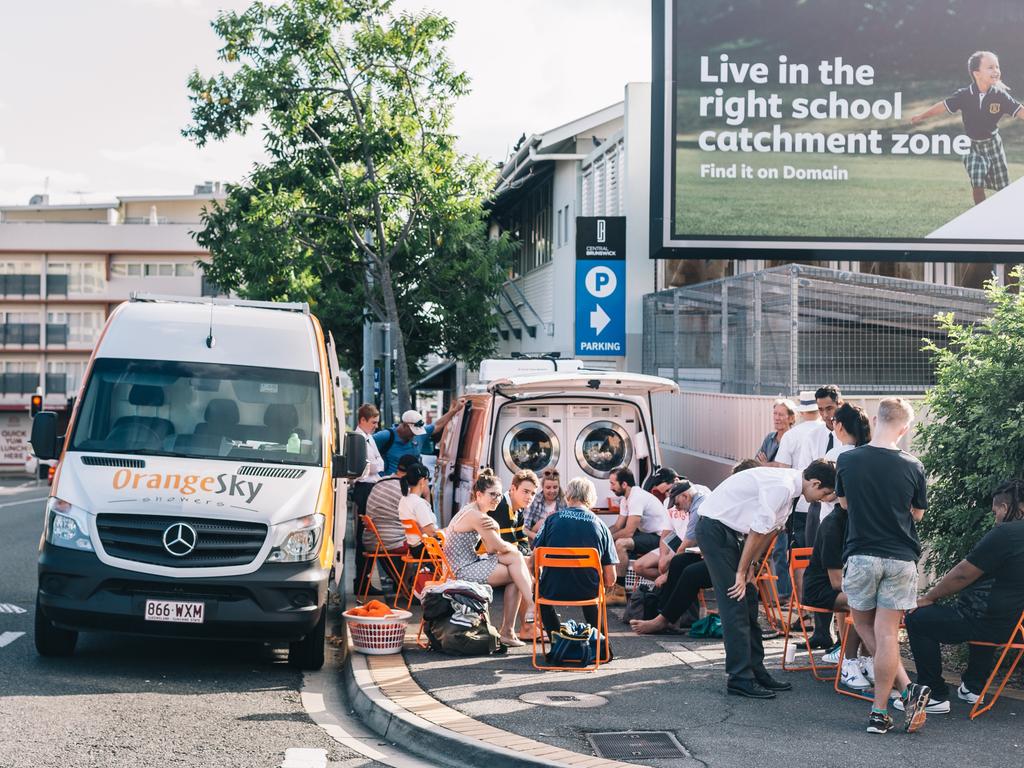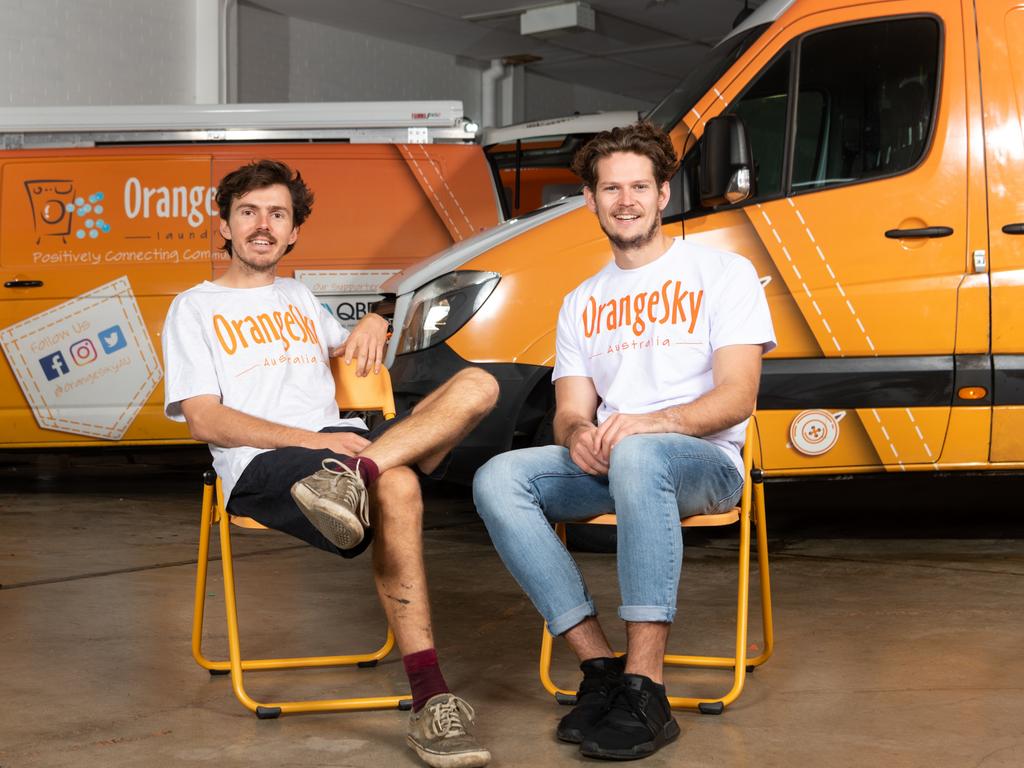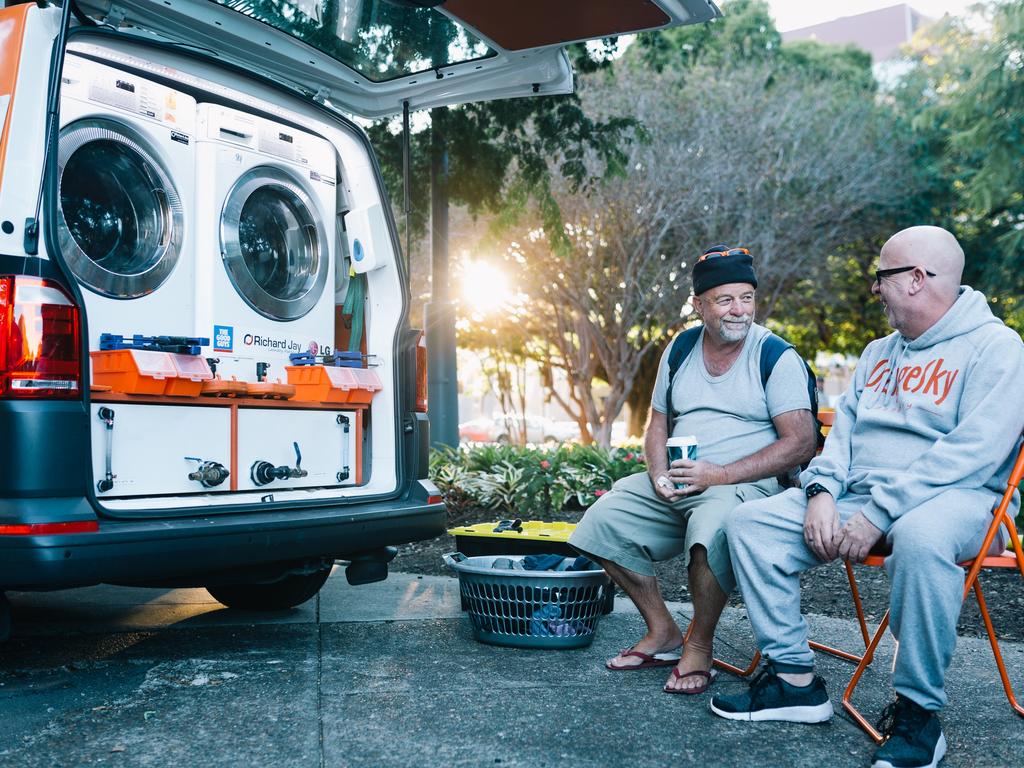Qld cost of living: ‘Working poor’ using homeless services
They may still have a roof over their head, but these Queenslanders are doing it so tough they’re using homeless services to plug gaps.
Queensland families are increasingly using homeless services to do laundry and have a hot meal once a week to make ends meet, with the skyrocketing cost of electricity and general living.
These young families and the “working poor” are helping to drive the huge spike in demand for a vital service that provides those experiencing financial hardship and the homeless with a free mobile laundry, showers and food.
The shocking situation comes as desperate Aussies seeking financial help jumped almost 30 per cent in the first four months of 2023, with mortgage and credit card repayments the biggest challenges.
Queensland-based charity Orange Sky said as the geographical footprint of homelessness had began to spread to the outer suburbs of the city and the regions and it wasn’t uncommon to see school uniforms being loaded into their washing machines.
CEO Lucas Patchett said there had been a 21 per cent increase in the use of their services with nine in ten people experiencing homelessness hidden from sight – sleeping in cars, couch surfing, or living in supported accommodation.

Mr Patchett said the stereotype of what people might assume homelessness looks like, people sleeping rough in Brisbane’s city or valley, make up just a small proportion of the people they help.
“The growth in demand that we’ve seen over the last couple of years has been in outer suburbs so places like Beenleigh, Redcliffe, Ipswich, Logan, Wynnum, that’s really where we’re seeing a massive spike in demand,” he said.
“Obviously we see still quite a few people around those city areas, but the biggest growth has definitely been in those sort of suburban centres … we’re seeing is pretty significant demand in regional areas, especially when compared to their city counterparts, at places like Townsville, Cairns, we just launched in Gladstone last week.”
Young families are some of the most common demographics that Orange Sky help and Mr Pratchett said the impacts of Covid-19 and now the housing and cost of living crises all contributed to the growing problem.
“A lot of the places we operate are in partnership with community meal providers, so take our shift in Ipswich, for instance, it’s mostly young families that are coming down who have a roof over the head, but they’re struggling to make ends meet,” he said.

“So for them to feed the family and do a load washing and save 40 or 50 bucks on the budget for the week, can have a massive, massive impact. “
The type of people using the service vary depending on where the vans are, but Mr Pratchett described meeting a man recently who was working full-time as a truck driver but declined a rental increase and thought he would find something new.
“Now he’s sleeping in his car. We are definitely seeing a growth in people like the working poor … it’s pretty common thing that we’re seeing is people and families or single parents with young kids,” he said.
In places like Wynnum, or Redcliffe, it is more common for volunteers to meet people living in their cars, with being close to the water giving an opportunity for bathing.
“I’d say that we see people from all walks of life, across the country doing we are doing 1700 loads of washing every week, and that’s a massive cross section of people who are doing it tough.
“So say in a place like Toowoomba, where we now operate, we’re seeing people just from the local community who are struggling, or who are referred through different local providers and stuff like that.”

But it was the Gold Coast that “punches above its weight” in terms of the number of people needing assistance compared to its overall population, Mr Patchett said.
It can also be revealed that there has been a 30 per cent jump in calls to the National Debt Helpline (NDH), with 45,291 calls in the first four months of 2023, up 29 per cent on the same period last year.
There were 9335 calls to NDH from struggling Queenslanders, up 22 per cent.
Lady Stewart, a financial counsellor with Financial Counselling Australia, said while the level of debt was hard to quantify there had been an increase in people struggling making ends meet, with many calling the NDH for the first time.
“They’re the working poor, possibly a two-income family. Anymore increases in cost of living and they’re not going to be able to pay their bills on time,” she said.
“We’re getting calls from people who are worried about further interest rate rises and their mortgages going up.”
She said banks’ hardship policies could help ease the pressure for those struggling with their credit card, personal loans or mortgage but there were fewer options to help cover strata or council rate debts, which were “just as important”.
“Strata organisations are very quick to move to debt collectors and court to pay it off – that can put you at risk of being forced into bankruptcy,” Ms Stewart said.




